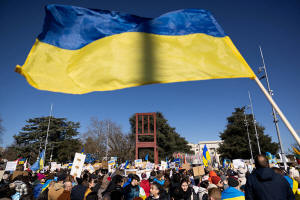Ukraine peace summit pushes neutral Swiss toward Western embrace
 Send a link to a friend
Send a link to a friend
 [May 10, 2024]
By Dave Graham [May 10, 2024]
By Dave Graham
ZURICH (Reuters) - An upcoming Ukraine peace summit, ostensibly the most
ambitious bid in years by neutral Switzerland to mediate a major
conflict, is instead showing how Swiss economic and security interests
increasingly align with Western Europe over Russia.
This is the view of both Swiss advocates of closer cooperation with
Western powers and nationalist opponents who say Switzerland is
abandoning its neutral tradition and should limit the scope for foreign
entanglements.
Russia has not been invited to the June 15-16 talks taking place at a
lakeside resort near the central city of Lucerne, which Switzerland
agreed in January to host at the behest of Ukrainian President Volodymyr
Zelenskiy.
Rather than ending the war, the summit is poised to work towards
mitigating risks stemming from Moscow's invasion of Ukraine and trying
to isolate Russia, according to Western diplomats and Swiss foreign
policy experts.
"It's going to be about shoring up Ukraine rather than bridge-building
for immediate peace," said Daniel Woker, a former Swiss ambassador to
Australia, Singapore and Kuwait.
Responding to a request by Reuters for comment, the Swiss foreign
ministry said Switzerland's neutrality is "constant" and will not be
altered by the conference.
"But being neutral does not mean being indifferent," it added in the
statement. "Switzerland strongly condemns Russia's aggression against
Ukraine. Outside the military realm, the right to neutrality does not
stand in the way of solidarity and support for Ukraine and its people."

The conference, which Switzerland says should pave the way for a "future
peace process", will focus on issues of global concern such as nuclear
safety, freedom of navigation, food security and humanitarian matters,
the ministry said.
Switzerland says Russia must be involved in the process, but justified
its lack of an invitation next month on the grounds Moscow had
repeatedly said it had no interest in taking part.
The Kremlin has described Switzerland as "openly hostile" and unfit to
mediate in peace-building efforts, in particular because of its adoption
of EU sanctions against Moscow.
Bern has asked over 160 delegations to the summit, pressing hard to
include to Russian allies from the so-called Global South, notably
China, which says it is considering taking part.
If the summit can craft consensus with Russian allies on areas of mutual
concern it could increase pressure on Moscow to compromise, diplomats
say.
European support for the summit is solidifying, with German Chancellor
Olaf Scholz confirming his attendance, alongside leaders from Spain,
Poland and Finland, among others.
NEUTRALITY
Thomas Borer, a former Swiss ambassador to Germany, said Switzerland's
business and security interests are overwhelmingly tied to Western
Europe, North America and their allies, making it strategically
imperative to stand with Ukraine.
Government protestations of neutrality would not change that, he added.
"Neither the Russians nor our Western allies view us as neutral," he
said.

[to top of second column]
|

A Ukrainian flag is waved during an anti-war protest, after Russia
launched a massive military operation against Ukraine, in front of
the United Nations Office in Geneva, Switzerland, February 26, 2022.
REUTERS/Pierre Albouy/File Photo

Around two-thirds of Swiss exports go to North America, the EU,
Britain, Japan and Australia. Less than 1% go to Russia.
Supporters of closer Western alignment also note Switzerland is
almost completely surrounded by NATO countries, which act as a
buffer against potential external intrusions.
"Neutrality is a cop-out for a country that's basically getting a
free ride off the security that others provide," said Franziska
Roth, a lawmaker in the Swiss parliament for the center-left Social
Democrats.
Since Russia invaded Ukraine, two of Europe's other historically
neutral states, Sweden and Finland, have both joined NATO.
As a U.N. member, Switzerland had a duty to uphold international
law, which the Russian invasion violated, Roth said. Helping Ukraine
recover from that took precedence over outdated notions of
neutrality, she added.
Neutrality is, however, firmly rooted in the Swiss psyche and
ditching it would be akin to Britain abolishing the monarchy,
regardless of the geopolitical forces pulling at the country, said
former ambassador Woker.
A study published in March by the Center for Security Studies at the
ETH Zurich showed 91% of Swiss felt the country should stay neutral,
though 26% also backed taking "a clear stand" in favour of one side
in foreign military conflicts, up 8 percentage points from 2021.
It also showed a majority in favor of Switzerland getting closer to
NATO.
Woker and other critics argue neutrality is an anachronism used as a
pretext for protecting Swiss economic and financial interests, and
risks isolating the country.
Recognized in 1815 by European powers after Napoleon's defeat and
enshrined in the 1907 Hague Convention, Swiss neutrality helped bind
together the multilingual confederation during the World Wars.

The right-wing Swiss Peoples' Party (SVP), the biggest group in the
Swiss lower house of parliament, argues neutrality is an integral
part of Switzerland's prosperity and that Bern's support for Ukraine
undermines it.
The SVP has initiated a referendum to embed neutrality in the
constitution, though it is unlikely to be held before 2025.
The party's most emblematic figure, Christoph Blocher, this month
criticized the peace summit, saying failure to invite Russia did not
augur well for Switzerland.
"We're only bringing the Ukrainians," he said. "And we say we're
neutral."
(Reporting by Dave Graham; Editing by Peter Graff)
[© 2024 Thomson Reuters. All rights reserved.]This material
may not be published, broadcast, rewritten or redistributed.
Thompson Reuters is solely responsible for this content. |